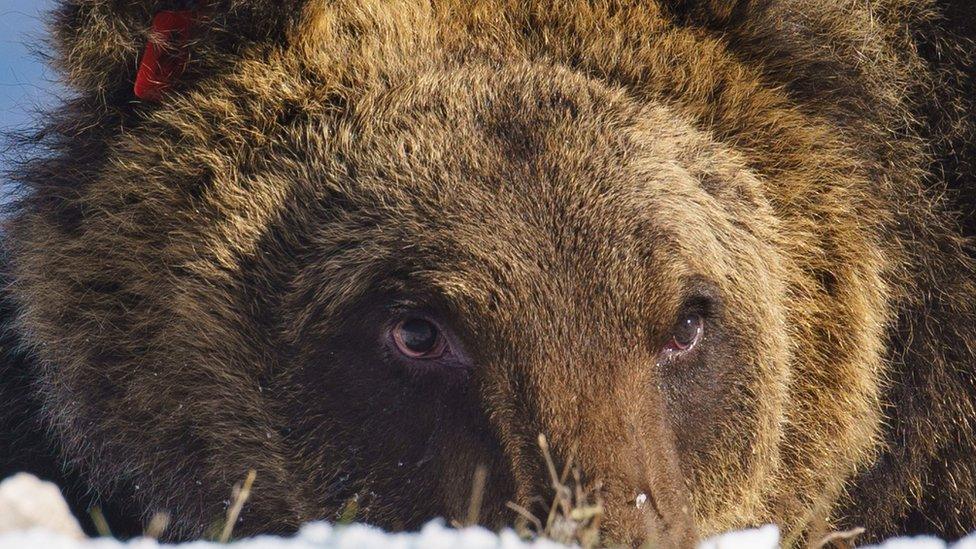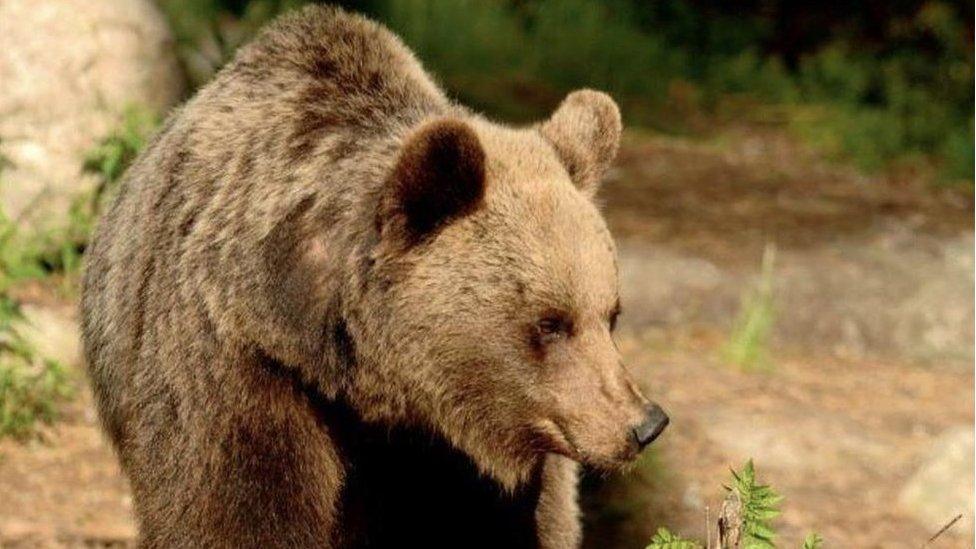Shock after popular bear shot dead in Italian town
- Published
Watch: Mother bear and cubs stroll through Italian town
A popular female bear has been shot dead on the outskirts of a town in central Italy and a man has claimed he opened fire out of fear.
The bear, named Amarena, was filmed earlier this week roaming around the town of San Sebastiano Dei Marsi with her two cubs.
Local governor Marco Marsilio said no bear in the Abruzzo region had ever threatened residents with any danger.
However, earlier this year a jogger was killed by a bear in the Alps.
There was widespread shock in Abruzzo that Amarena had been killed. The bear was well known in the area and named after a variety of black cherry that she was particularly fond of.
The governor said on social media that the killing was incomprehensible and was a "very grave act against the whole Abruzzo region which leaves pain and anger".
Environment Minister Gilberto Pichetto spoke of a "very serious episode" and said everything possible had to be done to ensure her two cubs were protected and remained free.
Amarena was one of about 60 critically endangered Marsican bears that live in the Abruzzo National Park and are native to central Italy.
The national park posted a graphic image, external of the bear lying dead on the ground and said in a statement that she had been hit by gunfire outside the park, on the outskirts of San Sebastiano dei Marsi.
Park rangers had quickly intervened, it said, because the cubs were there but vets were only able to confirm that the bear had died.
Although Amarena had caused damage in the past to crops and livestock, there was no justification for the attack, it said: "[Amarena] had never created any kind of problem for humans."
The man who killed the animal was identified and questioned by local police.
"I shot out of fear, but I didn't want to kill. I found her inside my property and it was an impulsive, instinctive act," he was quoted as saying by Ansa news agency.
Park director Luciano Sammarone told Ansa that the bear had crossed a private fence, but people should reserve judgement until it was established what had happened. "However, I'm struggling to believe this was a matter of self-defence."
"Amarena was a symbol of the park," said Piero Genovesi, head of Italy's wildlife service Ispra. "Everybody loved her. She was so frequently observed; she was never aggressive."
There had been some concern locally that the video which emerged on social media of Amarena and her two cubs on Tuesday had led to an influx of sightseers keen to get a glimpse of the bears.
In the footage, people in San Sebastiano Dei Marsi look on from a distance as the mother is seen walking through the town, waiting for her cubs and then moving down some steps away from the small crowd.
The two bear cubs have not yet been found and dozens of park rangers and police are trying to find them.
Mr Genovesi told the BBC that the cubs were only seven months old and it was important for them to be remain in nature "because bears have a tendency to become very rapidly used to humans".
There was no danger to people from the cubs, but there was a danger to the cubs, he explained, as they could already be too used to eating food made by humans.

Another of Amarena's cubs, Juan Carrito, had also been a frequent visitor to local villages before he died
Another of her cubs, named Juan Carrito, died in January after being hit by a car. He too was popular with locals, despite breaking into a bakery and eating a freshly baked batch of biscuits in 2021.
Animal protection organisation Oipa complained that Amarena was yet another victim of individuals allowed to carry weapons, but also of the climate of hatred towards large carnivores stirred up by some of Italy's political leaders.
The shock surrounding the latest death is very different from the events of last April, when Andrea Papi, 26, was fatally attacked in the north-eastern region of Trentino-Adige.
The bear blamed for killing him in the foothills of the Alps last spring was identified as JJ4 and the product of a programme to repopulate the area with bears from Slovenia.
Related topics
- Published12 April 2023
